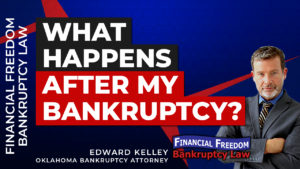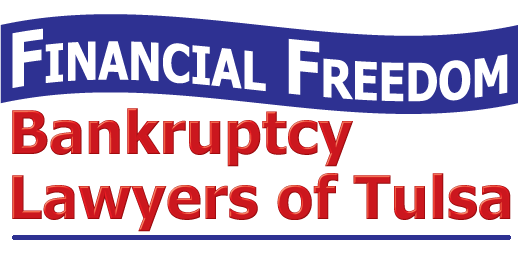Oklahoma Bankruptcy HelpWhat Happens After My Bankruptcy?
You Could Be Sent Many Subprime Credit Offers
Video Transcribed: Oklahoma Bankruptcy Attorney Edward Kelley with Financial Freedom of Tulsa. And on Facebook, we’re at Oklahomans For Debt Relief. My email, edward@wirthlawoffice.com. So we’re finishing up my little intro series on, what is Chapter 7 bankruptcy? Is it right for me? And we’ve talked about, how do I qualify? Again, the income cap based on your household size and your gross income before deductions.
So for a single person, 38,000 to 40,000, you’ll be okay. For each additional family member, about another 10,000. So if you’re over that, there are ways to bring you down. And if you’re too far over, then you can do a 13, which we’ll talk about another time.
Also, we talked about your assets, if there’s anything you’re worried about losing. And then we talked about your secure debts and what you want to keep and don’t keep, and whether you want to reaffirm. And then in the second video, we talked about the process.
90 days start to finish. I need your income, answers to a series of questions, the last two years of tax returns, copies of vehicle titles. As soon as I get that, I can have you filed in a day or two. If you’re getting a garnishment that filing will stop it in its tracks, 30 days after filing, I have a 341 creditor meeting, which usually takes about five minutes. It’s by phone at this point in time. And 60 days after that, you get your discharge process done.
And in that time, that second 60 days you will have filed any reaffirmations you’d want to file. So video number three, what happens after my bankruptcy? What has this done for me? So when you hit that discharge, one of the biggest questions I get is, how is this going to ruin my credit forever? And the answer for the vast majority of my clients is not at all, the opposite.
 In fact, your credit score may dramatically improve immediately. Now that’s no guarantee on my part. You had perfect credit. You had never missed a payment. And then you just knew things were coming and did a bankruptcy. Your credit’s going to take a hit.
In fact, your credit score may dramatically improve immediately. Now that’s no guarantee on my part. You had perfect credit. You had never missed a payment. And then you just knew things were coming and did a bankruptcy. Your credit’s going to take a hit.
The thing to understand is your credit score is based half on your faithful payment and a half on your debt-to-income ratio. The thing with people who come to me for bankruptcy is typically their debt-to-income ratio is in terrible shape.
If you look at your credit, you’ll see every loan that you have out there. Most of them report, and they know your income. So anyone looking at you knows immediately, do you actually have any money left over? And when you have 5, 10 loans out there, even if you’re making the minimum payments, it’s obvious to anyone that you have nothing leftover.
So your credit score plummets, regardless of whether you’ve paid faithfully. You do a bankruptcy, and that portion of your credit is perfected. All of that is gone. Now, all of your income is freed up. So bankruptcy will stay on for 8 to 10 years.
Not going to help you, but the debt-to-income usually will far outweigh the damage of the hit on the faithful payments. And of course, if you change your habits and pay faithfully from then on, by the time that drops up off of your credit, you will have extremely good credit.
So typically, what I tell people, I love that Dave Ramsey, Financial Peace, and I highly recommend anyone who’s gotten themself into bankruptcy from bad habits to look at that. And if possible, join that course and follow what it says, that will establish discipline and completely different habits for your spending.
If you can turn around bad habits, then bankruptcy can literally be the beginning of a whole new life for you. And we all know how stressful money problems can be and how often we create them. For some people though, we were talking about the sudden protracted loss of employment, unexpected medical tragedies. And for people who don’t have bad habits necessarily, but just have had an extremely bad misfortune, the same thing. Bankruptcy can clear that out.
That’s what it’s there for. That’s what it’s been created for. Because it’s good for our country, it’s good for our economy that our people have a chance to pull themselves out of holes. Having everyone fall into pits of debt doesn’t help anyone. But again, can’t recommend it highly enough. Dave Ramsey, Financial Peace. Just Google it, you’ll find it immediately.
But usually what happens is people after bankruptcy will be flooded with what they call subprime credit offers, lines of credit or signature loans, all those predatory loans, credit cards, the annual fee costs half of the minimum payment, but you can suddenly have a $100 by getting the card. You may get a ton of those offers.
That’s where you have to decide, “Am I going to go back to where I was? Or am I going to change my habits?” So again, rather than go into a lengthy soapbox tirade myself, I’ll refer you to Dave Ramsey. But I’m always available to talk to clients and help them with those habits after bankruptcy. So to summarize, after bankruptcy, what you’ve reaffirmed, you’ve still got, can’t do another bankruptcy for eight years.
Your credit’s probably improved, ironically. If it hasn’t, it will. Stay away from credit as much as you can. Again, paradoxically, ironically, the less you use it, typically the higher your score will go when you do need it. And as always, reach out to me with questions.
So that’s Oklahoma Chapter 7. Can I do it? How does it work? What happens after? You can always reach out to me, edward@wirthlawoffice.com, that’s W-I-R-T-H. Facebook, Oklahomans For Debt Relief. Always happy and excited to talk to people about turning their financial life around. So I look forward to speaking with all of you anytime.




